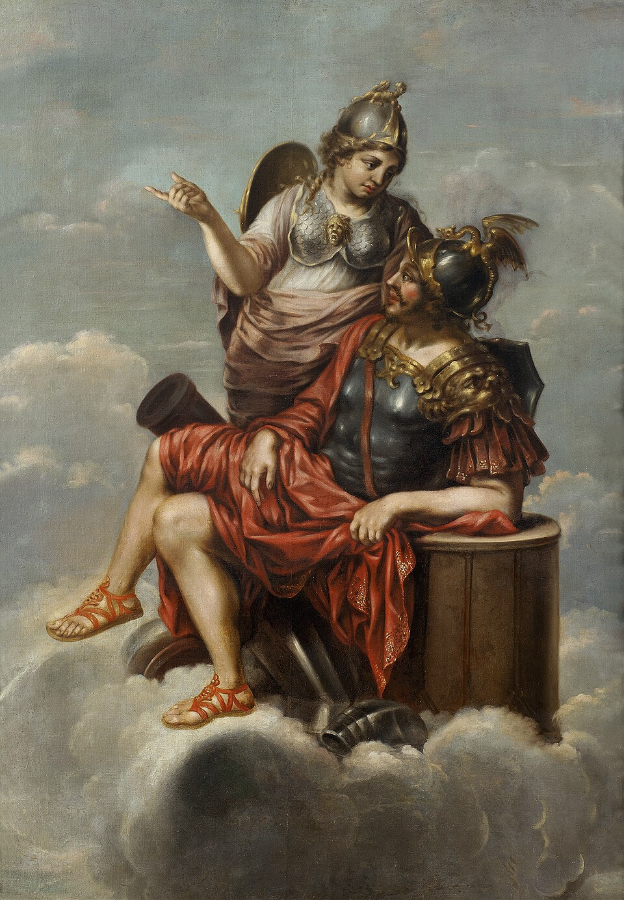Ares is the Greek god of war and courage. Ares was one of the Twelve Olympians in the archaic tradition represented by the Iliad and Odyssey. In Greek literature, Ares often represents the physical or violent and untamed aspect of war and is the personification of sheer brutality and bloodlust (“overwhelming, insatiable in battle, destructive, and man-slaughtering”, as Burkert puts it), in contrast to his sister, the armored Athena, whose functions as a goddess of intelligence include military strategy and generalship. An association with Ares endows places and objects with a savage, dangerous, or militarized quality; but when Ares does appear in myths, he typically faces humiliation. In Homer’s Iliad, Ares has no fixed allegiance. He promises Athena and Hera that he will fight for the Achaeans but Aphrodite persuades him to side with the Trojans. During the war, Diomedes fights Hector and sees Ares fighting on the Trojans’ side. Diomedes calls for his soldiers to withdraw. Zeus grants Athena permission to drive Ares from the battlefield. Encouraged by Hera and Athena, Diomedes thrusts with his spear at Ares. Athena drives the spear home, and all sides tremble at Ares’s cries. Ares flees to Mount Olympus, forcing the Trojans to fall back. Ares overhears that his son Ascalaphus has been killed and wants to change sides again, rejoining the Achaeans for vengeance, disregarding Zeus’s order that no Olympian should join the battle. Athena stops him. Later, when Zeus allows the gods to fight in the war again, Ares attacks Athena to avenge his previous injury. Athena overpowers him by striking him with a boulder.
| Alias Ares |
| Real Names/Alt Names Ares |
| Characteristics Myths & Legends, Prehuman Epoch |
| Creators/Key Contributors Homer |
| First Appearance Greek mythology |
| First Publisher ○ |
| Appearance List Literature: Homer’s Odyssey (c. 8th century BCE, English 1614), Homer’s Iliad (c. 8th century BC), Virgil’s Aeneid (29 to 19 BC), 5th century plays by Aeschylus, Sophocles (Ajax, Philoctetes), and Euripides (Hecuba, Rhesus, Cyclops), Plato’s Hippias Minor, Shakespeare’s Troilus and Cressida (1602), Dante Alighieri’s Divine Comedy (1308–1320), Lord Tennyson’s “Ulysses” (1842), The Story of Greece: Told to Boys and Girls by Mary Macgregor (191-?) [Internet Archive], Frederick Rolfe’s The Weird of the Wanderer (1912), James Joyce’s Ulysses (1918–1920), Nikos Kazantzakis’ The Odyssey: A Modern Sequel (1938), Eyvind Johnson’s Return to Ithaca (1946), The Luck of Troy (1961), et. al. Film: The Mysterious Island (1905), L’Odissea (1911), Ulysses (1954), Ulysses (1955), The Trojan Horse (1961), The Fury of Achilles (1962), Ulysses Against the Son of Hercules (1962), The Lion of Thebes (1964), et. al. Comics: Blue Bolt vol. 2 #1-2, Treasure Chest vol. 14 #5. |
| Sample Read The Iliad (Translated by W. C. Bryant, August, 1869) [Standard eBooks] |
| Description Ares is the Greek god of war and courage. Ares was one of the Twelve Olympians in the archaic tradition represented by the Iliad and Odyssey. In Greek literature, Ares often represents the physical or violent and untamed aspect of war and is the personification of sheer brutality and bloodlust (“overwhelming, insatiable in battle, destructive, and man-slaughtering”, as Burkert puts it), in contrast to his sister, the armored Athena, whose functions as a goddess of intelligence include military strategy and generalship. An association with Ares endows places and objects with a savage, dangerous, or militarized quality; but when Ares does appear in myths, he typically faces humiliation. In Homer’s Iliad, Ares has no fixed allegiance. He promises Athena and Hera that he will fight for the Achaeans but Aphrodite persuades him to side with the Trojans. During the war, Diomedes fights Hector and sees Ares fighting on the Trojans’ side. Diomedes calls for his soldiers to withdraw. Zeus grants Athena permission to drive Ares from the battlefield. Encouraged by Hera and Athena, Diomedes thrusts with his spear at Ares. Athena drives the spear home, and all sides tremble at Ares’s cries. Ares flees to Mount Olympus, forcing the Trojans to fall back. Ares overhears that his son Ascalaphus has been killed and wants to change sides again, rejoining the Achaeans for vengeance, disregarding Zeus’s order that no Olympian should join the battle. Athena stops him. Later, when Zeus allows the gods to fight in the war again, Ares attacks Athena to avenge his previous injury. Athena overpowers him by striking him with a boulder. |
| Source Ares – Wikipedia |


